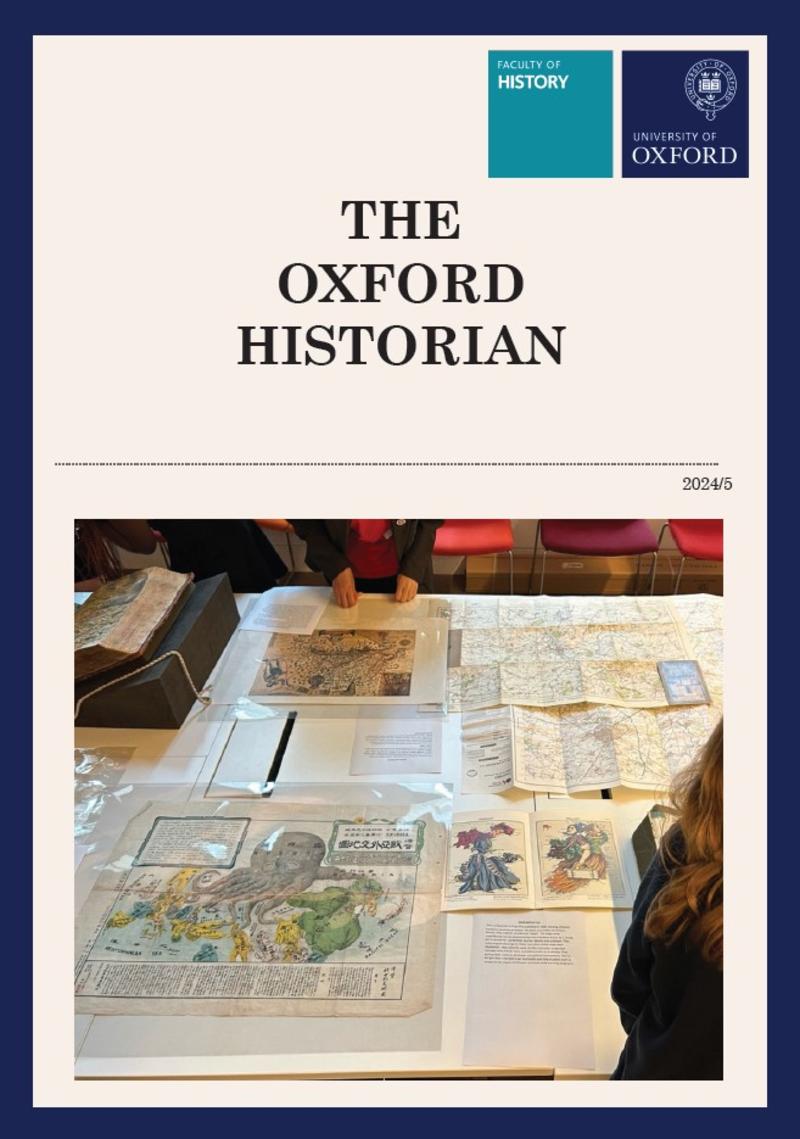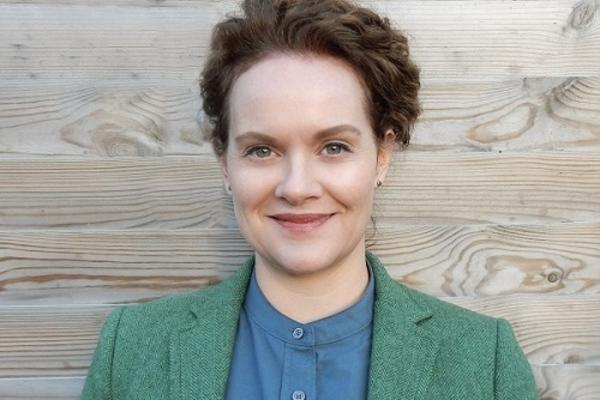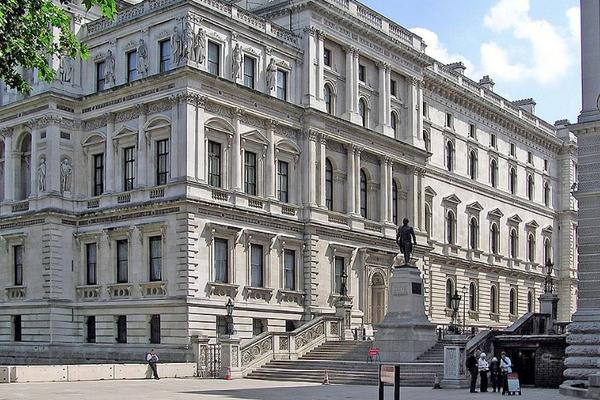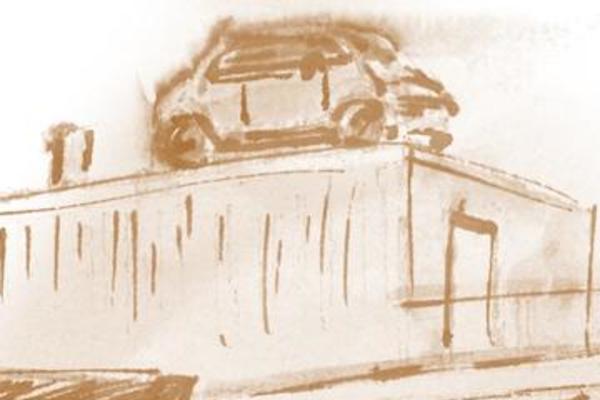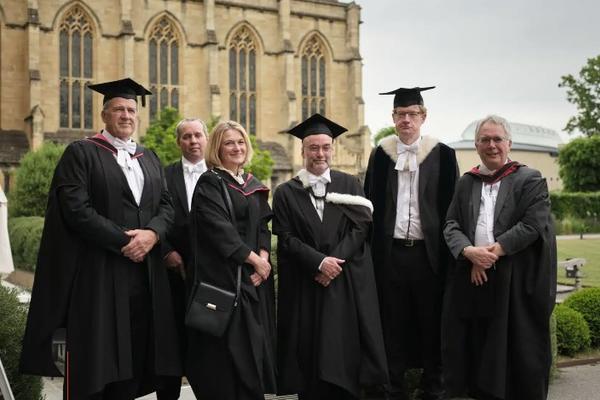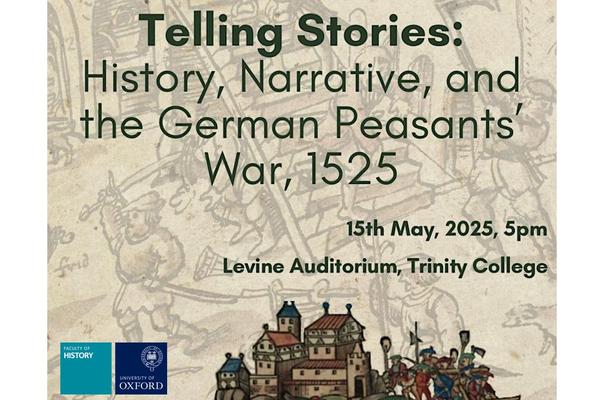The Oxford Historian (2024-25)
It is a great pleasure to have the opportunity to write to you again as Chair of the Board of History. Those with long memories may remember that I held this role a decade or so ago, and it has now rotated back to me for a second three-year term. It is a very good time to be returning to the office. Much has changed in the interim in the Faculty, and largely for the better. We have been able to recruit a number of new colleagues; we have expanded our graduate student body, especially at the Masters level; and amidst all of the changes in Britain, Europe and the world over the last few years, there is, one senses, a new hunger for the insights which History can provide. That is certainly true at the undergraduate level, where we continue to receive large numbers of applications, especially for the highly successful joint school of History and Politics.
There are of course challenges too. The current funding model for students, both undergraduate and graduate, is not fit for purpose. A fee-based system has many shortcomings, most obviously the burdens it places on students in terms of debt. But that is particularly so when the value of the fee income it generates has fallen well below the break-even point. The consequences of that are being seen in the considerable number of job losses and cutbacks that have taken place in British universities over the last year or so. Oxford, as always, is a rather special case.
The Faculty benefits more than most from grants won by our researchers, from fees from overseas students, and from donations from alumni. But the urgent need for a new model of undergraduate funding is surely obvious to all. That is also true at the Masters level. Over recent years, a Masters-level qualification has become much more the norm in many disciplines, and that is also now true in History. Therefore many of our undergraduates wish to stay on to do a Masters degree, and we receive many applications from elsewhere, including from Europe and North America. There is, however, almost no funding available to support students doing Masters degrees, obliging them to fall back on loans and the bank of mum and dad (with all of the consequent inequalities). You will hear more about this in a forthcoming mailing to all History alumni.
But there are also many positive stories. Prominent among these is the new building, The Schwarzman Building, currently being constructed on the site of the former Radcliffe Infirmary. This will become in the summer of 2025 the single home for almost all of the Humanities faculties in Oxford, and it will give the Faculty for the first time a purpose-built home for teaching, for research students, and for the numerous research-funded projects which operate under our aegis. Moving will be stressful, but it is also a great opportunity for the Faculty to build its own future.
Alongside this, the Faculty remains a busy and lively community: the largest institution in the world, as we always rightly boast, for the study of History, and one which continues to expand into new regions of Global History, and new domains of cultural and social history. I hope that this newsletter will give you a sense of what we are doing, and we hope you are pleased with what you find.
Martin Conway
Chair of the History Faculty Board
Analogies and comparisons are the small change of historical debate, and there can be few tutors in Oxford who have not on occasions resorted in tutorial discussion to comparisons between, say, Henry VIII and Churchill, or indeed the collapse of the Habsburg Empire and the events of 1989. Such exercises are, on the whole, exercises in thinking rather than suggestions of a real connection between different individuals and eras; and more sustained discussion of these comparisons tends to move rapidly towards emphasising the many differences between contexts and circumstances. But many of us have surely found our minds wandering over the last few months to the discordant echoes of the past in the unsettling changes of the present. Keir Starmer has not yet resorted in the manner of Margaret Thatcher in 1990 to summoning historians to Chequers to explain the impact of German re-unification. But the more things seem new and unprecedented, the more our minds – and wider public debate –turns to the reference points of the past. If that serves as a lesson for the government of the benefits of a historical education (and therefore perhaps increased funding for it), then we are unlikely to complain. But historians have always seen their subject as something more than an archive of past models which can be brought out to illuminate the present. Whatever else we might think about Donald Trump, the Alternative für Deutschland, and the Putin regime, they clearly have a novelty which negates any simple equivalence between historical precedents and the disconcerting present.
But recognition of the novelty of our present times does not negate the value of a perspective informed by the past. As David Priestland makes clear in his article in this issue on a recent visit to Budapest, present-day Hungary remains dominated by the legacies of its recent and more distant history. At a superficial level, this is scarcely surprising: Europe, perhaps more than other regions of the world, has found it difficult to exit from the narratives of its twentieth-century upheavals. Analogies from the two world wars, the politics of Communism and fascism, and the long-term narratives of collective and individual emancipation, remain part of our intellectual furniture; and nowhere more so than on the Oxford History syllabus. Alumni of different generations will have their own memories as to when History “ended” during their studies. For a long time, it was around 1939, before it leapt in stages to 1973 (British entry into the EEC) and 1989. Nowadays there is no defined terminus to Oxford History. With the globalisation of the syllabus, any single narrative has been replaced by different timeframes, which in some cases (notably Britain) extend to the present, or in papers on other areas of the World, opt for pragmatic terminal dates such as 1989 or 2001.
The logic of such frontiers is understandable, especially when one thinks of the scarcity of source material and secondary works which make sense of the very recent past. But the conclusion that emerges from the disconcerting rapidity of events over recent months is surely that the past and the present do not exist in different realms. Our task is therefore not to reach for a rather faded wardrobe of past models, but instead to historicise the present, by placing it in its own context. A recent generous donation has made it possible for the Faculty to create a new Professorship in Contemporary European History, which seeks to break through the curtain of 1989, and engage with the history of the European present. What that might consist of remains in many ways unclear, and the impact it will have on the History syllabus will take time to become clear. But, in the meantime, it gives us some tools for understanding the world we inhabit.
Martin Conway
Chair of the History Faculty Board
It’s hard to believe that it’s fourteen years since I was appointed Regius Chair of History, and it has been a huge honour to be the first woman to hold the post, in either Oxford or Cambridge.
When I arrived, I happened to be the only woman Statutory Chair at the time, and the minute taker and I were often the only women in committee meetings. There were no images of women in the entire building, and one of my first jobs was to oversee the hanging of the pictures of all my predecessors up the stairs to my office. It is hard now to remember how much has changed. Did I really hear it argued, at the first Governing Body meeting I ever attended at Oxford, and as the only woman in the room, that wives should not be allowed to come to guest nights, as it would ‘lower the tone’? And, twenty years later at another college, did a Fellow seriously claim that it was rational to admit more men than women, since they performed better in Finals? Those days have gone. We now have approaching as many women Statutory Professors as men, and women are properly represented on all committees. Soon there will be no-one left still teaching undergraduates who was formed during the world of single-sex-college Oxford, and the memories of what it was like will have faded.
We will also be leaving this September the wonderful building which has housed us for so many years, the Oxford School for Boys, which closed in 1966 and which made for an unfortunate letterhead. But that school, founded by Balliol and the City Council as a ladder of learning for local boys to have access to universities like Oxford, has stood for a moral ideal that has not lost its relevance; and I’ll be sad to leave the building with its quirky architectural extravagances and high ceilings, not to mention the 24 power sockets in my office. It has a personal meaning for me, because it was once the Social Studies Faculty, and when I first came to Oxford, it was where the Women’s Studies Committee met, an intellectual home for me and many others in a climate that wasn’t generally welcoming.
The History Faculty now is a very different place. The arrival of women has meant an expansion of the kinds of history we do. We now have the Hillary Rodham Chair of Women’s History, and the Jonathan Cooper Chair of the History of Sexualities, so that we are probably the leading place worldwide to do gender, women’s and queer history and where these approaches are complementary.
Not long ago, the Oxford History syllabus was built around the division between History of the British Isles, and ‘the rest’, General History; now Global history as well as European history are important parts of what we do, and British History is no longer the yardstick against which everything else is measured; indeed we think not just about England but about Wales, Scotland and Ireland.
We have a new emphasis in environmental history with new courses; we work with museums on art and material culture; we have links with local history and community groups; it’s possible to do part time Master’s degrees and part time doctorates after a campaign started by my predecessor Robert Evans. All these changes have come about through initiatives and hard work by many people – the Race and Resistance group has changed the faculty hugely, as has the Disability History group and what is now known as the Women’s, Gender, Identity and Queer History centre.
This hasn’t meant that we aren’t continuing to do outstanding political history, economic history, military history, intellectual history and the kinds of history we have always excelled in; indeed these areas are growing too – Oxford now has its own approach to intellectual history, ‘colonial history’ takes new forms that no longer centre the metropole, we study the history of war in the broadest sense, while economic history challenges us to think about old problems with new methods. This expansion has enriched us all while giving heft to the new approaches.
The new Schwarzmann Building (to which we are moving imminently) offers so many new and wonderful possibilities as we come together with linguists, philosophers, literary scholars, history of art, music and other scholars. At last we will have a theatre space and a concert hall on site, opening up new ways of doing history. And we hope to be able to strengthen our cooperations with colleagues around the world, with partners in Pisa, Berlin, Princeton, Central European University and many more – what we could do together is truly exciting.
I look forward to seeing where the coming generation will take History, and I’ve loved being the Faculty’s Regius and having the chance to work with such an extraordinary, open-hearted group of people, undergraduates, graduates, ECRs, administrative staff and Faculty. True, we face challenges; but I don’t know anywhere else which manages the same combination of respect for colleagues, commitment to teaching, and passionate intellectual engagement.
Lyndal Roper
Regius Professor of History
Embedding the humanities in the environment
Oxford Policy Engagement Network (OPEN) & The History Faculty - Historical expertise and the shaping and evaluating of foreign policy
The Cowley Car History Project
History Faculty Success at 2025 Vice-Chancellor’s Awards
Catherine Jenkinson nominated for Vice-Chancellor’s Awards for the Breakthrough Researcher Award
A Historic First: Inaugural Lecture of the Jonathan Cooper Chair of the History of Sexualities
Regius Valedictory Lecture: Telling Stories: History, Narrative, and the German Peasants’ War, 1525
Recent Publications
Community History Hub
Are you a History Teacher?
Historia Lectures
